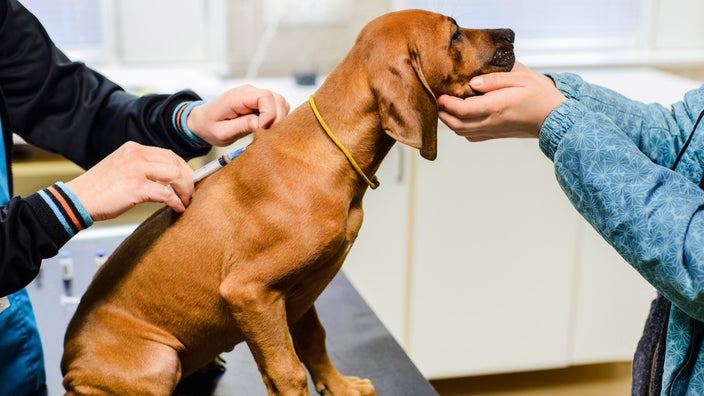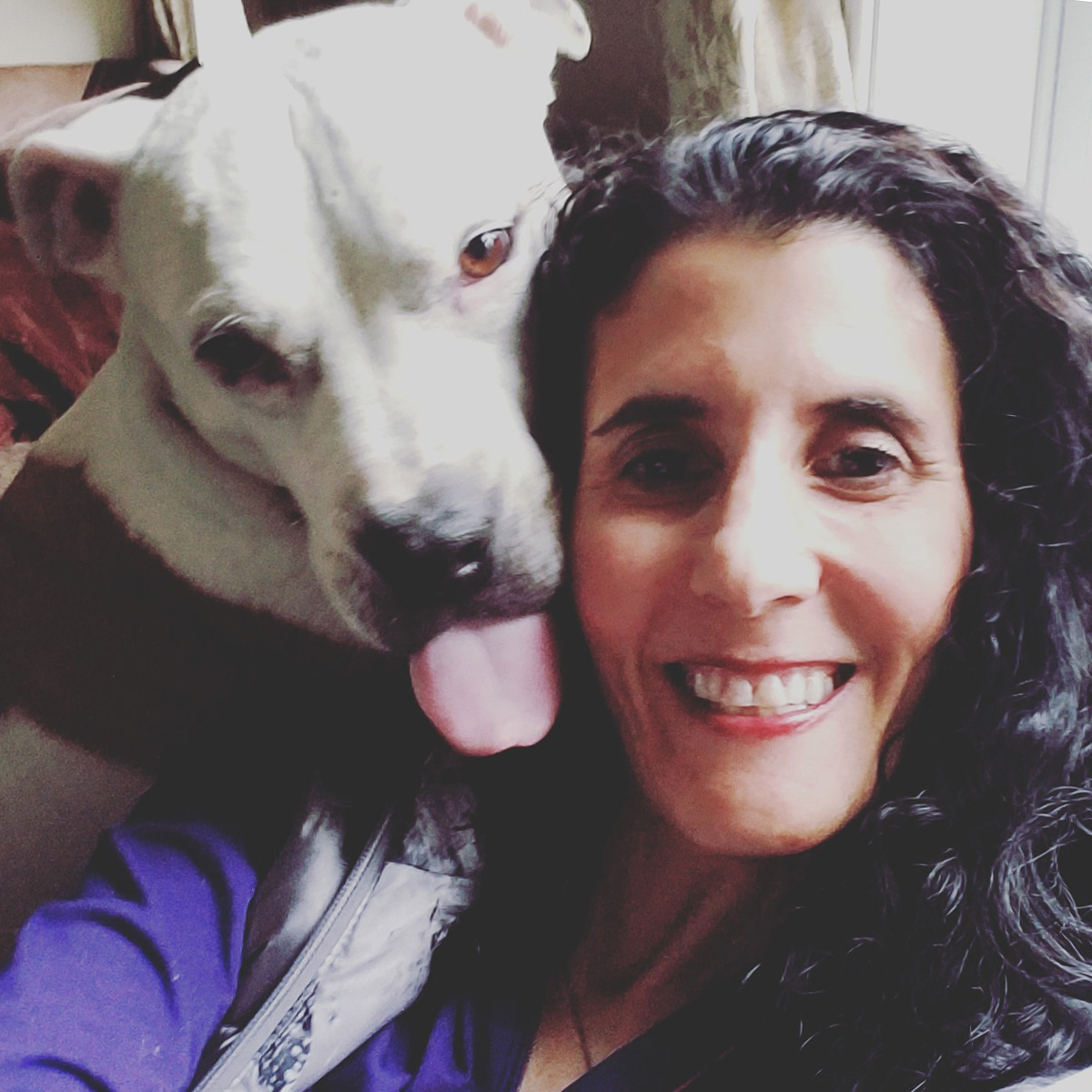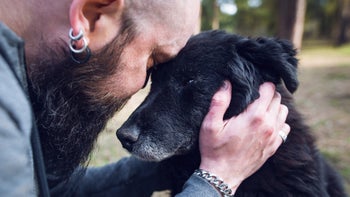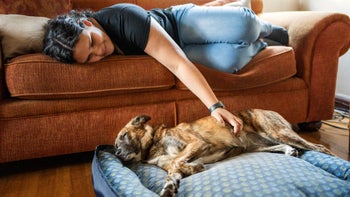
Kennel Cough in Dogs: Learn About the Symptoms and What to Do
Key takeaways:
Kennel cough is a highly contagious, common airway infection in dogs that can be caused by several viruses and bacteria.
The most common symptom of kennel cough is a loud, hacking cough. It can also cause a runny nose and sneezing.
The best way to prevent kennel cough is to vaccinate your dog each year, especially if they spend time around many other dogs.
Table of contents

If you have ever made arrangements for your canine companion to stay at a boarding facility for a few days, you may have been asked to prove they are vaccinated against kennel cough. And that question — which suggests your dog could be in danger of illness — may have been enough to make you want to reconsider your travel plans.
Before you think about canceling any plans just to avoid boarding your pup, learn the facts about kennel cough and getting your pet vaccinated against it.
What is kennel cough?
Kennel cough is the nickname for a highly contagious, common airway infection in dogs. It usually spreads in places where there are many dogs in close quarters, like a kennel, boarding facility, or shelter.
Save on the top 10 pet medications
Save big on common pet medications like Fluoxetine and Levetiracetam at your local pharmacy.

GoodRx is NOT insurance. GoodRx Health information and resources are reviewed by our editorial staff with medical and healthcare policy and pricing experience. See our editorial policy for more detail. We also provide access to services offered by GoodRx and our partners when we think these services might be useful to our visitors. We may receive compensation when a user decides to leverage these services, but making them available does not influence the medical content our editorial staff provides.
Kennel cough earned its name because its primary symptom is an unmistakable, dry, hacking (or honking) cough in dogs. Several viruses and bacteria can cause the illness. But because they all cause similar symptoms, the various types of infections are referred to as kennel cough.
Kennel cough symptoms in dogs
The most distinctive symptom of kennel cough is a loud, hacking cough or retch. Other common kennel cough symptoms are:
Eye discharge
Sneezing
In more severe cases, or if left untreated, kennel cough can cause:
Decreased appetite
Lethargy
If your dog contracts kennel cough, any symptoms they develop will likely appear 2 to 3 days after exposure. However, it can take up to 14 days for symptoms to develop.
It’s best to seek advice from your veterinarian as soon as you notice kennel cough symptoms. These symptoms can be similar to those of more severe illnesses like canine distemper and dog flu (canine influenza).
What causes kennel cough?
The main viruses and bacteria that can cause or contribute to the development of kennel cough are:
Bordetella bronchiseptica is the most common bacteria to cause kennel cough. This bacteria causes inflammation of your dog’s upper respiratory tract.
Canine parainfluenza, also known as CPIV, is one of the most common viruses to cause kennel cough. While its symptoms are similar to those of canine influenza, the viruses are different and require different vaccinations.
Canine adenovirus 2, also known as CAV-2, is a respiratory disease that’s usually spread from one dog to another by coughing.
Canine distemper can be transmitted from one dog to another through the air or through shared food and water dishes. It can also be passed from a mother to her pups in the womb.
Read more like this
Explore these related articles, suggested for readers like you.
How does kennel cough spread?
Similar to a human cold, kennel cough spreads in the following ways:
Through direct contact with other infected dogs
Through airborne droplets that are released when an infected dog coughs or sneezes
Through contact with contaminated surfaces, such as shared water bowls or toys
Dogs usually contract kennel cough in places where many dogs congregate, such as boarding facilities, doggie daycare centers, training centers, dog parks, and dog shows. Certain factors — such as the stress of being confined at a boarding facility and poor air quality or ventilation — make dogs more susceptible to contracting kennel cough.
While kennel cough spreads easily, it is also very treatable and often clears up on its own. However, it can be more severe in puppies under 6 months old, older dogs, and dogs with underlying health conditions.
Kennel cough treatment and medication options
In most cases, kennel cough will go away on its own and doesn’t require treatment. But your veterinarian might recommend medications to help manage your dog’s kennel cough symptoms. This may include cough suppressants.
Depending on the severity of the infection, your vet may also recommend a round of antibiotics. Antibiotics can kill bacteria that cause a type of kennel cough that can lead to pneumonia or other complications.
Do not give your dog human remedies to address the infection. This includes over-the-counter human cough medication, cold medication, and home remedies for kennel cough.
There are some things you can do to make your dog more comfortable while they recover, however:
Use a harness rather than a collar and lead for walking. This will reduce irritation to the windpipe.
Provide a quiet, warm space for your dog to rest.
Run a humidifier to help moisten your dog’s air passages.
Wipe any discharge from your dog’s eyes and nose with a warm, damp towel.
Make sure your dog is in a clean, well-ventilated area.
Quarantine your dog from other dogs to avoid spreading the illness.
Dogs recovering from kennel cough should be kept away from other dogs while they have symptoms and for 2 weeks after their symptoms disappear. You should also thoroughly disinfect all surfaces and items they’re in contact with to prevent reinfection.
How long does kennel cough last?
Most standard cases of kennel cough last about a week. But, in some cases, dogs take longer to recover. For example, some types of kennel cough can lead to bronchitis or pneumonia, which is a serious complication that takes longer to treat.
How to prevent kennel cough
The best way to prevent kennel cough is to make sure your dog is up to date on all their vaccinations. To start, this includes vaccines that are considered core for all dogs, including:
Adenovirus type 2
Parainfluenza
Canine distemper
If your dog often spends time with other dogs, speak to your vet about other vaccines that can protect your pup. To help prevent kennel cough, the two additional vaccines available for dogs are:
Bordetella
Canine influenza
Is kennel cough contagious to humans?
It is rare for humans to contract kennel cough. But in cases in which Bordetella bronchiseptica causes the kennel cough infection, people with compromised immune systems may need to take extra precautions. This includes people with human immunodeficiency virus (HIV) and cancer.
Even in these cases, the chances of humans contracting kennel cough are still minimal.
Can cats get kennel cough, too?
Cats can develop a condition similar to kennel cough in dogs, which is called feline bordetellosis. Like with dogs, this condition is most likely to spread in places where many cats stay close together, such as rescue organizations and cat colonies.
Common signs of feline bordetellosis in cats include:
Coughing
Sneezing
Retching
Nasal discharge
Cats kept as indoor pets or in small groups are far less likely to get feline bordetellosis. But like with dogs, this condition usually goes away on its own in about 10 days. There is also a Bordetella vaccine for cats that can provide some protection in high-risk situations.
The bottom line
While kennel cough is very contagious, it is also highly treatable. The most common symptoms of kennel cough include a dry cough, runny nose, sneezing and eye discharge. Most of the time, dogs who get kennel cough will recover on their own. Depending on your dog’s infection, though, your veterinarian may prescribe medications to ease their symptoms.
Kennel cough happens most often when dogs spend a lot of time in close quarters with each other. So if your dog regularly spends time at doggie daycare or a boarding facility, make sure they’re up to date on their vaccinations to help prevent kennel cough. You can also ask your vet about adding additional protection with the canine influenza and Bordetella vaccines.
Why trust our experts?



References
American Animal Hospital Association. (2020). Non-core vaccines for pet cats.
American Animal Hospital Association. (2022). 2022 AAHA canine vaccination guidelines.
American Kennel Club. (2023). Dog flu: Symptoms, treatment, and prevention.
American Veterinary Medical Association. (n.d.). Canine distemper.
Brooks, W. (2022). Kennel cough in dogs. Veterinary Partner.
Brooks, W. (2024). Pneumonia management in dogs and cats. Veterinary Partner.
Burke, A. (2022). Distemper in dogs – Causes, symptoms, & treatment. American Kennel Club.
Dworkin, M. S., et al. (1999). Bordetella bronchiseptica infection in human immunodeficiency virus-infected patients. Clinical Infectious Diseases.
Home Health U.K. (n.d.). Canine parainfluenza virus (CPIV).
Merck Animal Health. (n.d.). Bordetella bronchiseptica.
Merck Animal Health. (n.d.). Canine adenovirus type 2.
Merck Animal Health. (n.d.). Feline bordetellosis.
Nafe, L. A. (2014). Diagnostic and therapeutic approach: Dogs infected with Bordetella bronchiseptica and canine influenza virus (H3N8). Today's Veterinary Practice.




























